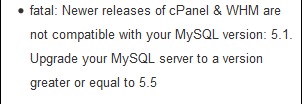You see a pop-up notification asking you to update your browser. What do you do? Update the software, ignore the alert or postpone it to a future date? If you tend to overlook such notifications, its time to reconsider.
Updates help to ensure that your software is secure. Server software such as cPanel offers auto-update feature to secure your server from vulnerability. But there are times this auto-update fails with a notification message ‘Last Attempt to Update cPanel & WHM was Blocked’ in WHM. This is a blocker!
A blocker is the main reason why cPanel & WHM update process fails. Blockers can be license errors, RPM database integrity errors, MySQL version incompatibility, low disk space, cPanel restrictions, etc. When faced with a blocker, the solution is to identify the type of the blocker and resolve it.
A common blocker is MySQL version incompatibility. It has to be fixed by upgrading the MySQL version in the server. The MySQL upgrade process can vary, depending on the server OS. Bobcares engineers help hosting companies perform smooth server upgrades through our dedicated support services and webhosting support services.
Recently our team fixed this error for a customer who provides shared hosting services based on CloudLinux 6.6 with cPanel 11.48. In CloudLinux, MySQL upgrade can be easily performed with MySQL Governor. MySQL Governor is a set of utilities to monitor and restrict MySQL usage in a shared hosting environment. However, the upgrade process can face hurdles due to version mismatch or custom MySQL directory settings. We noticed this blocker notification in the WHM (Web Host Manager) of the server.

Last attempt to update was blocked
The blocker message said ‘The Last Attempt to Update cPanel & WHM was Blocked’. We checked the ‘Details‘ and found this:

MySQL blocker in cPanel
Fixing the notification ‘Last Attempt to Update cPanel & WHM was Blocked’
The error message ‘Newer releases of Cpanel and WHM are not compatible with your mysql version: 5.1. Upgrade your mysqlserver to a version greater or equal to 5.5.’ indicates that the MySQL version is outdated and has to be updated. We decided to upgrade MySQL version from MySQL-5.1 to MySQL-5.5 to resolve this error. Before proceeding with the upgrade, we took the backup of the entire database directory as a proactive measure.
First we checked whether the db-select-mysql utility for CloudLinux was present in the server. But we could not find it at the location ‘/usr/share/lve/dbgovernor/db-select-mysql‘. We found that the ‘governor-mysql’ package in the server was an older version.
root@SERVERNAME [~]# rpm -qa | grep governor governor-mysql-0.9-15.el6.cloudlinux.x86_64
We updated it to the latest version with the command ‘yum update governor-mysql –enablerepo=cloudlinux-updates-testing’.
root@SERVERNAME [~]# rpm -qa | grep governor governor-mysql-1.0-77.el6.cloudlinux.x86_64
The database selection utility came enabled in the latest version of MySQL Governor. We then successfully upgraded the MySQL server to version 5.5.
/usr/share/lve/dbgovernor/db-select-mysql –mysql-version=mysql55 /usr/share/lve/dbgovernor/mysqlgovernor.py –install
The next step was to rebuild PHP in the server for the websites to function properly. We ran Easyapache script in the WHM for this. The PHP rebuild worked fine but we noticed some websites throwing up Error 503.
The apache error log showed this:
relocation error: symbol deflateInit2_, version libmysqlclient_16 not defined in file libmysqlclient.so.16 with link time reference
This is caused due to a corrupted libmysqlclient.so. In order to fix the issue, we created a symbolic link like this:
ln -s /usr/lib64/libmysqlclient.so.16.0.0 /usr/lib64/mysql/libmysqlclient.so.16
We then restarted the MySQL service and reloaded the sites after clearing the browser cache. The 503 error was gone and the sites started loading fine. The blocker message in the WHM also got fixed.
MySQL should be upgraded only after considering the configuration changes, server changes and SQL changes. Issues post upgrade include mysqld server not starting, unable to connect to mysqld server, user-defined functions not working, etc. Based on the type of the error, further recompilation or reconfiguration may be required to resolve these issues. Bobcares helps hosting companies upgrade their server software without any downtime, by proactively identifying and resolving such roadblocks.
Bobcares helps web hosts and other online businesses deliver reliable and secure services through our 24/7 Web Hosting Support.







Is this dangerous if I just ignore it? My host told me they will fix it, rebuild it, but now they are telling me they can do it for me if I want….. (!!?). I wish I could tell them that for the next 12 months I may think about paying them and then forget to pay them? Would that be a good solution? One host said it is dangerous and asked me to move to them…. What should I do?
P.S. Mine is this more infoed:
Please correct these issues and rerun updates.
fatal:
The cPanel & WHM update cannot proceed because the following feature is out of date: suEXEC
You must either rebuild Apache with EasyApache 3 or migrate to EasyApache 4:
/usr/local/cpanel/scripts/easyapache –build
or:
/usr/local/cpanel/scripts/migrate_ea3_to_ea4 –run
Tom,
It is always important that the server runs latest stable and secure versions of software. You’d have to ask your host to update their server software without delay.
Thank you! I think now i can solve the problem!